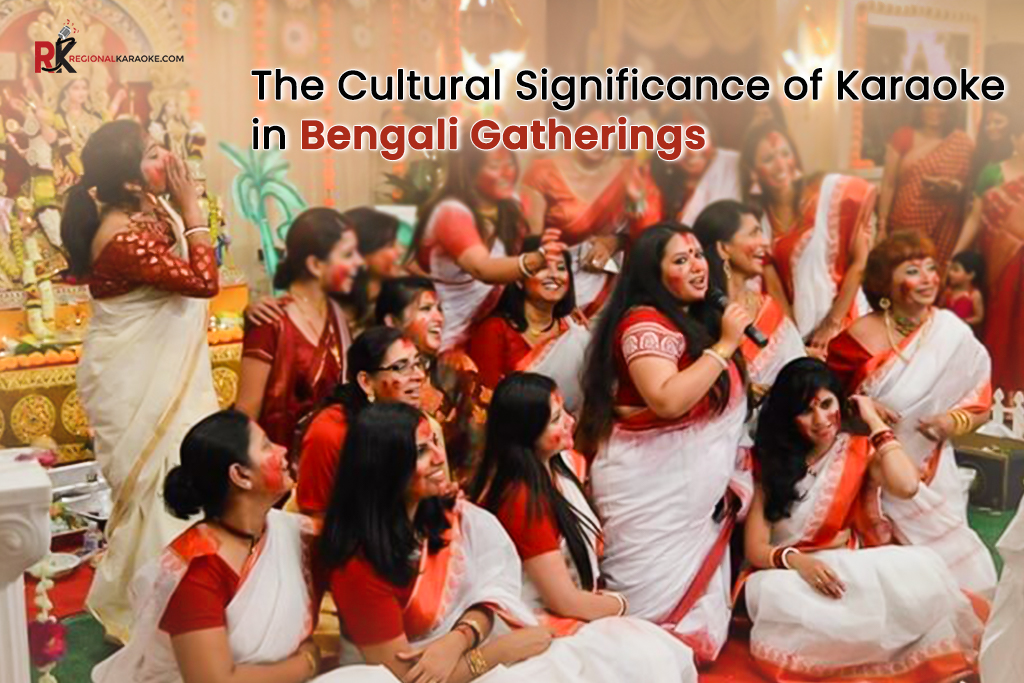Anniversary Store-Wide Karaoke Sale | 45% Off | USE COUPON CODE - RKTURNS13
The Cultural Significance of Karaoke in Bengali Gatherings [UPDATED]

- Music: The Soul of Bengali Culture
- Karaoke in Bengali Festivities
- A Nostalgic Connection to Bengali Cinema & Music
- Encouraging Musical Talent & Community Bonding
- Modern Technology & Bengali Karaoke
- Why Karaoke Matters in Bengali Get-Togethers?
- Karaoke as a Bridge Between Tradition and Modernity
- Bengali Festivals and Karaoke Celebrations
- Karaoke and Bengali Adda: The Perfect Combination
- The Role of Karaoke in Preserving Bengali Music
- Bangla Karaoke Beyond Borders
- Top Bengali Karaoke Songs for Any Gathering
- Top Techniques for Perfecting Your Bengali Karaoke Performance
- How to Set Up a Bengali Karaoke Night at Home
- Conclusion
Karaoke is like a musical party where everyone gets to be a star. But it's more than just singing—it's a way for Bengali people to connect, celebrate their culture, and make memories. Imagine a big family get-together or a festive gathering of Bengali people. There's something special they like to do, and that is karaoke! It's not just about singing; it's about their culture and community coming together. Let's find out why karaoke is a big deal in Bengali gatherings and what makes it a cherished tradition for the Bengali community.
Music: The Soul of Bengali Culture
Bengalis have an intrinsic connection with music. The diversity in Bengali music is immense, from Rabindra Sangeet to modern Bangla bands. Music is not just an art form in Bengal but a way of life. The rich literary and musical heritage, shaped by poets and composers like Rabindranath Tagore, Kazi Nazrul Islam, and Atulprasad Sen, is essential to Bengali identity. Karaoke, in this context, provides an accessible way for individuals to engage with these musical traditions, whether they are trained singers or enthusiastic amateurs.
Karaoke in Bengali Festivities
Bengali gatherings are incomplete without music, especially during festivals like Durga Puja, Pohela Boishakh (Bengali New Year), and Saraswati Puja. While live music performances have traditionally been a significant aspect of these celebrations, karaoke has gained popularity due to its convenience and inclusivity. It allows everyone, from children to elders, to participate in singing their favorite songs without the need for professional training.
- Durga Puja Adda & Karaoke
Bengalis engage in long adda (casual discussions) during Durga Puja, which is filled with music, poetry, and laughter. Karaoke sessions in these gatherings unite people to sing classic Bengali songs, including old film songs, Rabindra Sangeet, and contemporary hits. - Pohela Boishakh Celebrations
The first day of the Bengali calendar is marked with cultural programs, folk music, and traditional songs. Karaoke allows people to sing their favorite Bangla songs, from Lalon Geeti to Dwijendralal Ray compositions, keeping the spirit of cultural revival alive. - Wedding & Family Gatherings
Bengali weddings, known for their grandeur and cultural vibrancy, include karaoke sessions where guests sing romantic duets and nostalgic melodies. Similarly, family reunions often become lively karaoke nights where generations bond over timeless Bengali classics.
A Nostalgic Connection to Bengali Cinema & Music
Bengali cinema, especially the golden era of the 1950s-70s, produced iconic songs that remain cherished. Singers like Hemanta Mukherjee, Manna Dey, Kishore Kumar, and Sandhya Mukhopadhyay gave the Bengali audience a treasure trove of melodies. Karaoke has revived these classics, allowing music lovers to relive the golden days of Bengali cinema. Whether it’s an old Uttam Kumar-Suchitra Sen duet or a soulful Nachiketa song, karaoke brings back memories and emotions tied to these musical masterpieces.
Encouraging Musical Talent & Community Bonding
Karaoke has also played a significant role in encouraging young Bengali artists and music enthusiasts. Many budding singers use karaoke as a platform to refine their skills, explore their vocal abilities, and perform confidently in social gatherings. It has become a stepping stone for those who aspire to further pursue their passion for music.
Additionally, karaoke fosters a sense of community. Whether in Kolkata, Bangladesh, or among the Bengali diaspora worldwide, karaoke gatherings are an opportunity to connect with fellow Bengalis, share cultural stories, and celebrate the essence of being Bengali through music.
Modern Technology & Bengali Karaoke
With advancements in digital platforms, Bengali karaoke tracks with lyrics are now readily available online. Websites and apps provide access to an extensive library of Bengali songs with synchronized lyrics, making it easier for enthusiasts to sing along. This has led to the rise of online karaoke competitions and virtual gatherings, further expanding the reach of Bengali music.
Why Karaoke Matters in Bengali Get-Togethers?
Karaoke holds a special place in Bengali get-togethers as it combines the joy of music with cultural expression and social bonding. It brings together people of all ages and skill levels, allowing them to relax, have fun, and showcase their singing talents. Whether through friendly competitions, the celebration of Bengali music, or the preservation of the Bengali language, karaoke adds a unique dimension to these gatherings, fostering unity and creating cherished memories for all participating.
1. Bringing Everyone Together
Bengali gatherings usually have people from different backgrounds. Some may be from West Bengal, some from Bangladesh, and others from various places worldwide. Karaoke, with its inclusive nature, is something that everyone can enjoy, regardless of where they come from. It helps everyone feel like they belong, fostering a sense of unity and inclusivity.
2. Keeping Tradition Alive
Bengali culture has beautiful songs written by famous poets like Rabindranath Tagore and Kazi Nazrul Islam. These songs are essential to Bengali people. Karaoke, by allowing people to sing these songs, especially the younger generation, who may not have heard them as much, plays a crucial role in keeping these traditions alive and connecting the audience to their cultural roots.
3. Showcasing Talent
Bengali people are proud of their singing talent. Karaoke, by allowing everyone to show off their skills, whether they are professional singers or not, provides a platform for the audience to showcase their talent. Sometimes, at these gatherings, people take turns singing their favorite songs, which is a great way to support and encourage each other, fostering a sense of pride and community support.
4. Building Stronger Bonds
Karaoke is not just about singing; it's also about having fun together. When people sing together, it creates a sense of togetherness. This strengthens their relationships and helps them make lasting memories.
5. Sharing Emotions and Stories
Bengali songs are known for expressing deep emotions and telling powerful stories. People can share their feelings and stories through their chosen songs when they sing. It's a way of opening up and letting others into their world.
6. Mixing Old with New
While Bengali music has a rich tradition, karaoke also allows modern twists. Sometimes, people mix old and new songs, creating something fresh and exciting. This shows how Bengali culture can adapt and stay vibrant.
7. Musical Diversity
Bengali music is incredibly diverse, ranging from classical Rabindra Sangeet to the folk rhythms of Baul songs. Karaoke allows Bengalis to explore this vast musical landscape. It's a chance for people to appreciate and learn about different styles of Bengali music they might not have encountered otherwise. It's like a musical journey through Bengal's rich and varied culture.
8. Passing Down Traditions
In Bengali families, it's common for elders to teach younger family members traditional songs through karaoke. This passing down of musical knowledge and cultural traditions helps maintain a connection between generations. It ensures that the songs and stories of the past continue to be cherished and celebrated.
9. Celebrating Festivals and Special Occasions
Bengalis are known for their love of celebrations, whether it's Durga Puja, Bengali New Year (Pohela Boishakh), or weddings. Karaoke often takes center stage during these festive occasions. It's a way for everyone to participate in the festivities, adding a joyful and interactive element to these special moments.
10. Expressing Patriotism
Bengali songs have played a significant role in the political and social history of the region. Karaoke can become a medium for expressing Patriotism and social awareness. During political change or societal issues, Bengali gatherings may feature songs with strong messages, invoking a sense of unity and purpose among the participants.
11. Fostering Creativity
Karaoke is not limited to singing existing songs; it also encourages creativity. Some Bengali enthusiasts compose their lyrics or adapt traditional songs to reflect contemporary themes. This artistic expression is a testament to the adaptability and innovative spirit of the Bengali community.
Karaoke as a Bridge Between Tradition and Modernity
Bengali gatherings have long been synonymous with music. Whether it is an adda (casual get-together), a family function, or a community event, singing has always been a vital part of the celebration. The introduction of karaoke has made musical participation more inclusive, allowing people of all ages and skill levels to sing their favorite Bengali karaoke songs without requiring instrumental accompaniment.
With access to karaoke tracks of Rabindra Sangeet, Nazrul Geeti, and modern Bengali film songs, enthusiasts can immerse themselves in a rich musical experience. This shift reflects the seamless blending of tradition with modern technology, ensuring that cultural heritage remains alive while embracing contemporary trends.
Bengali Festivals and Karaoke Celebrations
Bengalis celebrate numerous festivals with grandeur, and music is always at the heart of these celebrations. Karaoke has found its place in several key festivals:
- Durga Puja: The most celebrated festival among Bengalis, Durga Puja, is incomplete without cultural programs. Karaoke nights have become a common feature in Puja pandals and community halls, where people gather to sing devotional and contemporary Bengali songs.
- Pohela Boishakh (Bengali New Year): Marking the first day of the Bengali calendar, Pohela Boishakh is a time for music and merriment. Families and friends host get-togethers where karaoke sessions bring people together to sing popular Bengali melodies.
- Lakshmi Puja and Kali Puja: While these religious occasions are deeply spiritual, many Bengali households incorporate music into their celebrations. Karaoke performances often feature bhajans and classical Bengali songs dedicated to the deities.
- Wedding and Pre-Wedding Functions: Bengali weddings are known for their cultural richness, and music plays a vital role in events like the aiburobhat (pre-wedding feast) and sangeet. Karaoke provides an interactive and enjoyable way for guests to participate in the musical festivities.
Karaoke and Bengali Adda: The Perfect Combination
Bengalis are known for their love of adda—a session of intellectual discussions, humor, and storytelling, often accompanied by tea and snacks. Karaoke has added another layer of enjoyment to these gatherings. Instead of merely reminiscing about old songs or debating the best singers, participants now take turns singing their favorite tracks. This has made Adda even more engaging and interactive, strengthening bonds between friends and family members.
The Role of Karaoke in Preserving Bengali Music
One of the biggest advantages of karaoke is its role in preserving and popularizing Bengali music. Many younger generations, who might not have been introduced to classic Bengali songs, find karaoke an accessible way to explore traditional music. Karaoke platforms provide a vast collection of Bengali songs spanning various genres, ensuring that timeless classics do not fade into obscurity.
Moreover, karaoke allows amateur singers to practice and refine their vocal skills, fostering a new generation of Bengali music enthusiasts. Many individuals who develop a passion for singing through karaoke eventually take up professional training in classical or contemporary Bengali music.
Bangla Karaoke Beyond Borders
The Bengali diaspora, spread across the globe, has embraced karaoke to stay connected to their roots. Whether in London, New York, or Sydney, Bengali communities organize cultural events where karaoke singing is a highlight. It provides expatriates an emotional link to their homeland, rekindling memories of growing up in a musically vibrant environment.
Online platforms have further expanded the reach of Bengali karaoke. Virtual karaoke competitions and online singing groups allow Bengalis worldwide to showcase their talents and celebrate their musical heritage together despite physical distances.
Top Bengali Karaoke Songs for Any Gathering
A great karaoke session requires a fantastic song selection. Here are some must-have Bengali songs for any gathering:
- Rabindra Sangeet: "Aguner Poroshmoni," "Purano Shei Diner Kotha"
- Nazrul Geeti: "Eki Oporoop Roop-e Maa," "Dola Dola Dola"
- Folk Songs: "Baul Amar," "Bhober Deshe"
- Modern Bengali Hits: "E Tumi Kemon Tumi," "Mon Majhi Re"
- Bollywood Bengali Favorites: Songs from Kishore Kumar, Arijit Singh
Top Techniques for Perfecting Your Bengali Karaoke Performance
Want to make your Bengali karaoke performance stand out? If you're looking to enhance your singing skills and command the stage with confidence, be sure to check out our detailed guide on the Top Techniques to Perfect Bengali Karaoke. In this blog, we’ve shared effective tips and techniques that will help you elevate your performance and make a lasting impression.
1. Choose the Right Song
Selecting a song that matches your vocal range is crucial. If you're a beginner, start with simpler melodies before moving to more complex compositions like Rabindra Sangeet.
2. Understand the Lyrics
Bengali songs are known for their poetic depth. Take time to understand the meaning behind the lyrics so you can deliver them with the right emotion.
3. Focus on Pronunciation
Bengali pronunciation is unique, especially with sounds like "ষ" and "ঞ." Practicing the correct enunciation will help your performance sound more authentic.
4. Work on Breath Control
Many Bengali songs require sustained notes and smooth transitions. Practice breathing techniques to control long phrases and avoid straining your voice.
5. Add Expression and Emotion
The soul of Bengali music lies in its expression. Whether it’s the melancholic beauty of Rabindra Sangeet or the powerful intensity of Nazrul Geeti, delivering a song with the right emotion makes a huge difference.
6. Experiment with Modulation
Don’t just sing in a flat tone—vary your pitch, volume, and tempo to bring the song to life. Modulation adds depth and keeps your audience engaged.
7. Use a Good Karaoke Setup
Use a quality microphone and speakers to enhance your sound. Proper audio equipment can make a significant difference in the overall experience.
8. Have Fun!
At the end of the day, karaoke is about enjoying the moment. Even if you miss a note, don’t stress—just sing enthusiastically and confidently!
How to Set Up a Bengali Karaoke Night at Home
Planning a karaoke night? Here’s how to create the perfect atmosphere:
- Choose a good sound system: A microphone and speakers enhance the experience.
- Select a mix of songs: Include a variety of classic, folk, and modern Bengali tracks.
- Encourage group performances: Singing duets or group songs adds more excitement.
- Create a themed setup: Decorate the space with lights and a small stage area.
Conclusion
Karaoke in Bengali gatherings is more than just a form of entertainment; it is a cultural expression that bridges generations, revives musical traditions, and strengthens social bonds. Whether at a festival, a family get-together, or an informal adda, karaoke brings joy and a shared sense of identity among Bengalis.





